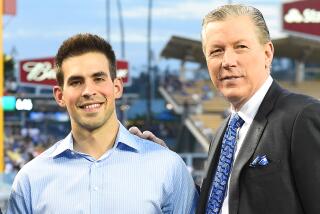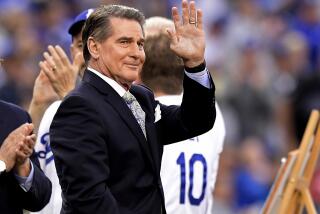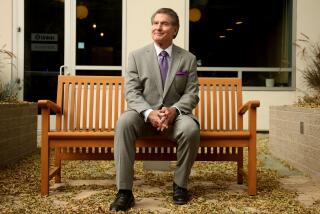Ending the Depression : Some of Dravecky’s Worst Days Came After Losing His Arm to Cancer, but Counseling and a Lot of Support From His Wife Pulled Him Through
- Share via
LA JOLLA — Dave Dravecky is smiling now, but the road back hasn’t been easy.
As upbeat as Dravecky has appeared to the public since losing his left arm to cancer last June, the former Padre and San Francisco Giant pitcher acknowledged Wednesday there was a time when he was depressed.
Dravecky, who turned 36 on Feb. 14, told of his ordeal before teeing off in the pro-am preliminary to the Buick Invitational of California at Torrey Pines. He lives in Youngstown, Ohio, and this was his first visit to San Diego since he was honored before a Padre game last September.
“For some time I had strength as an amputee because I had a message that could help others,” Dravecky said. “But after killing myself on the speaking circuit, I experienced burnout, and dealing with it was a problem for me. I looked in the mirror and I didn’t like what I saw. I went into depression.
“It got so bad that I sought Christian counseling. I went through a grieving process, but I didn’t know how to grieve.
“When you’re an athlete, they tell you to suck it up, to pull up your bootstraps, to be tough and never show your emotions. But I couldn’t handle it. For the first time, I was frustrated. The thing that was my livelihood--my left arm--was gone.”
Dravecky noted that his wife, Jan, had initiated the idea of seeing a counselor.
“She was really struggling,” Dravecky said. “She had lost her father in ‘89, and everything added up. She wanted us to go to a counselor, and I appeased her.
“We’re still in counseling, and we’ve benefited very much from it.”
What was the turning point?
“It occurred over a period of sessions,” Dravecky said. “Basically, the lesson I learned was that it was OK to admit fear. I’m not boasting, but I found that to be a strength, instead of putting on a facade.”
Dravecky recalled that his wife had helped him over the same barrier of fear at the start of his major league career, which ran from 1982 to 1989 and which he completed with a 64-57 record.
“When I came up with the Padres, I was terrible,” he said. “My wife asked what was wrong, and for the first time I admitted that I was scared. After that, I was able to go out and not see everybody I faced as Babe Ruth, which I was doing.
“The rest is history. I wound up sticking around.”
Although he still gives speeches, Dravecky has reduced his schedule.
“I was speaking eight or 10 times a month,” he said. “I had no training whatsoever, and to this day I’m amazed that I’ve been able to do it. I wouldn’t have thought it possible in a million years.”
Asked if he had a few standard speeches, he said: “No, I don’t prepare anything. I basically share what’s in my heart. I’m aware of what kind of audience I have, and I allow my talk to take its own course.
“It’s a source of encouragement to other people, and that in essence helps me. It also keeps me from thinking about the things I have to handle personally.”
Golf is the first sport Dravecky has undertaken since his arm was amputated, and he doesn’t have much experience to fall back on.
“I played very little golf during my baseball career,” he said. “My wife was already a baseball widow, and I didn’t want to make her a golf widow as well.”
Add to this the fact that Dravecky has had to adjust to being right-handed, and it is surprising that he does as well on the links as he does. Amateurs’ scores are not kept in pro-ams, but he had one par in his round on the North course at Torrey Pines, sinking a long chip shot on the 12th hole.
“This is only the fourth time I’ve played,” he said. “The first two times, I couldn’t finish 18 holes. I was tired. I got tired today, but I think it was because of jet lag. I got in late last night.”
Appropriately, Dravecky engaged a former Padre and Giant teammate, ex-catcher Terry Kennedy, to serve as his caddie. Kennedy, who lives in Escondido, retired after last season and has gone back to school, working toward his business degree at Cal State San Marcos. He called Dravecky to offer his services.
“I need four or five semesters,” said Kennedy, who attended Florida State before starting his baseball career. “It’s tough getting back into a school groove after 17 years.”
Asked if he had a golf handicap, Kennedy said: “Yeah, my wedge.”
A crowd gathered at the first tee when Dravecky began his round at 11:07 a.m. Before he teed off, he said, “You folks out there in front, heads up.” He then hit a 30-yard pop-up that left the fans silent but followed with a 170-yarder that drew a big cheer, then hit a personal-best 185-yard drive on No. 2.
Once, when he flubbed a shot out of the rough, Dravecky said: “I could have used my foot wedge and hit it farther than that.”
Another time, when he whiffed in an attempt to escape a bunker, he quipped: “That was a practice swing.”
Along the way, Dravecky signed autograph after autograph, many in the middle of the fairway. When he finished, he signed one for Jessica Esquivel, a 7-year-old Imperial Beach girl who lost four limbs because of a bacterial infection. Jessica now has prostheses and walks remarkably well.
Dravecky told Jessica he had written a children’s book, “Welcome Back, Dave,” and said, “If I can get your address, I’ll send you a copy.” Jessica’s eyes lit up, and her mother quickly provided her address.
The book Dravecky mentioned is one of four, two for children, that he has turned out since his retirement. “Comeback” was his first, and “When You Can’t Come Back” is to be published next fall. “Welcome Back Dave” is for ages 6 through 8, “Comeback for Kids” for ages 9 through 12.
For Dravecky’s reaction to his pro-am experience, one had only to see the smile on his face.
“I had a ball,” he said. “Having so much fun on this beautiful golf course in beautiful San Diego. It was awesome.”
More to Read
Go beyond the scoreboard
Get the latest on L.A.'s teams in the daily Sports Report newsletter.
You may occasionally receive promotional content from the Los Angeles Times.










